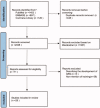The frequency of assessment tools in arthroscopic training: a systematic review
- PMID: 35695551
- PMCID: PMC9225735
- DOI: 10.1080/07853890.2022.2085317
The frequency of assessment tools in arthroscopic training: a systematic review
Abstract
Background: Multiple assessment tools are used in arthroscopic training and play an important role in feedback. However, it is not fully recognized as to the standard way to apply these tools. Our study aimed to investigate the use of assessment tools in arthroscopic training and determine whether there is an optimal way to apply various assessment tools in arthroscopic training.
Methods: A search was performed using PubMed, Embase and Cochrane Library electronic databases for articles published in English from January 2000 to July 2021. Eligible for inclusion were primary research articles related to using assessment tools for the evaluation of arthroscopic skills and training environments. Studies that focussed only on therapeutic cases, did not report outcome measures of technical skills, or did not mention arthroscopic skills training were excluded.
Results: A total of 28 studies were included for review. Multiple assessment tools were used in arthroscopic training. The most common objective metric was completion time, reported in 21 studies. Technical parameters based on simulator or external equipment, such as instrument path length, hand movement, visual parameters and injury, were also widely used. Subjective assessment tools included checklists and global rating scales (GRS). Among these, the most commonly used GRS was the Arthroscopic Surgical Skill Evaluation Tool (ASSET). Most of the studies combined objective metrics and subjective assessment scales in the evaluation of arthroscopic skill training.
Conclusions: Overall, both subjective and objective assessment tools can be used as feedback for basic arthroscopic skill training, but there are still differences in the frequency of application in different contexts. Despite this, combined use of subjective and objective assessment tools can be applied to more situations and skills and can be the optimal way for assessment.
Level of evidence: Level III, systematic review of level I to III studies. Key messagesBoth subjective and objective assessment tools can be used as feedback for basic arthroscopic skill training.Combined use of subjective and objective assessment tools can be applied to more situations and skills and can be the optimal way for assessment.
Keywords: Arthroscopy; arthroscopic skills; assessment; feedback; training.
Conflict of interest statement
The authors declare that they have no competing interests.
Figures
Similar articles
-
Global Rating Scales for the Assessment of Arthroscopic Surgical Skills: A Systematic Review.Arthroscopy. 2020 Apr;36(4):1156-1173. doi: 10.1016/j.arthro.2019.09.025. Epub 2020 Jan 14. Arthroscopy. 2020. PMID: 31948719
-
Arthroscopic proficiency: methods in evaluating competency.BMC Med Educ. 2013 May 1;13:61. doi: 10.1186/1472-6920-13-61. BMC Med Educ. 2013. PMID: 23631421 Free PMC article.
-
Assessing Arthroscopic Skills Using Wireless Elbow-Worn Motion Sensors.J Bone Joint Surg Am. 2015 Jul 1;97(13):1119-27. doi: 10.2106/JBJS.N.01043. J Bone Joint Surg Am. 2015. PMID: 26135079
-
The Efficacy of Arthroscopic Simulation Training on Clinical Ability: A Systematic Review.Arthroscopy. 2021 Mar;37(3):1000-1007.e1. doi: 10.1016/j.arthro.2020.09.018. Epub 2020 Nov 18. Arthroscopy. 2021. PMID: 33220467
-
Virtual Reality Compared with Bench-Top Simulation in the Acquisition of Arthroscopic Skill: A Randomized Controlled Trial.J Bone Joint Surg Am. 2017 Apr 5;99(7):e34. doi: 10.2106/JBJS.16.00324. J Bone Joint Surg Am. 2017. PMID: 28375898 Clinical Trial.
Cited by
-
The number of arthroscopies performed by trainees does not deduce the level of their arthroscopic proficiency.Knee Surg Sports Traumatol Arthrosc. 2023 Oct;31(10):4231-4238. doi: 10.1007/s00167-023-07471-3. Epub 2023 Jun 9. Knee Surg Sports Traumatol Arthrosc. 2023. PMID: 37296326
References
-
- Garrett WE, Swiontkowski MF, Weinstein JN, et al. . American board of orthopaedic surgery practice of the orthopaedic surgeon: part-II, certification examination case mix. J Bone Joint Surg Am. 2006;88(3):1–667. - PubMed
-
- Feldman MD, Brand JC, Rossi MJ, et al. . Arthroscopic training in the 21st century: a changing paradigm. Arthroscopy. 2017;33(11):1913–1915. - PubMed
-
- Cuschieri A, Francis N, Crosby J, et al. . What do master surgeons think of surgical competence and revalidation? Am J Surg. 2001;182(2):110–116. - PubMed
Publication types
MeSH terms
LinkOut - more resources
Full Text Sources
Research Materials

